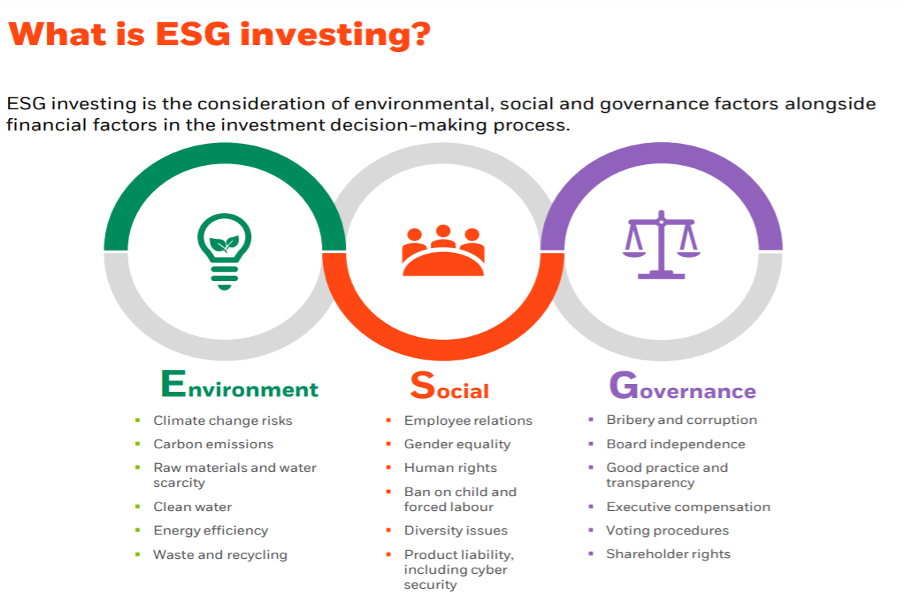The case for ESG investing
ESG is essentially an acronym which stands for Environmental, Social and Governance.
According to Wikipedia, ESG investing refers to the application of these three factors to assess the sustainability and social impact of an investment in a company.
Historically investment decisions have often been based on financial factors. But, in recent years, there is a growing emphasis on non- financial factors as well – to ensures that the environment, society and minority shareholders are protected too. In other words, ESG investing involves considering Environmental, Social and Governance factors along with financial factors when making investment decisions.
More on ESG
Let’s start with E - Environment.
It includes taking into account factors like climate change risk, carbon emission, resource depletion, clean water, energy efficiency, waste and pollution, recycling and deforestation – just to name a few factors - before investing in a company
S - Social - will include factors like working conditions, child labour, slavery, the impact of a company’s business on local communities including indigenous communities, health and safety issues, employee relations, gender equality, human rights and diversity issues.
Finally, G or Governance will include factors like shareholders’ rights, voting procedures, board independence, board diversity, transparency, executive compensation, corruption, political lobbying and donations.

Source: BlackRock
ESG vs socially responsible & sustainable investing
Taken loosely, ESG investing, sustainable investing and socially responsible investing are one and the same.
The key idea is basically to invest in companies with sustainable businesses. In other words, adopting an investment approach that aims to achieve a better and more sustainable future for our society.
Going mainstream
ESG highlights big problems that requires big solutions – global climate change being a case in point.
Policies and laws need to change, and greater global co-ordination is needed. But even as these problems appear insurmountable, that has not stopped people from trying to make a difference. Investors are no different. They want to help. After all, a healthy, more equitable society is good for the longevity of businesses and overall prosperity. The hope is that through the voting power of their dollar, investors are able to help steer economic activity in the right direction.
What is heartening is that more and more companies are embracing ESG and making business decisions based on them.
This is because companies recognise that they must play their part in improving the world and ensuring a more sustainable future for our society.
Traditionally, little regard is given to the sustainability of a company’s actions beyond the bottom line. Sustainability mattered where dividend payments or profits were concerned. The environmental or social consequences of corporate actions mattered less in valuing investment opportunities. But this is not the case today. The call for social responsibility and collective action has triggered a movement. Socially responsible investing has taken root. It is slowly moving out of a niche territory into the mainstream.
Good concept, but how to execute?
ESG sounds good as a concept, but how would one systematically incorporate ESG factors in the investment process? Fortunately, a great deal of work and research through the years have gone into creating a variety of ESG scoring frameworks to identify companies with better ESG profiles. As mentioned earlier, sustainable businesses tend to be companies with better environmental standards, employee relations and higher proportion of institutional ownership and outside directors.
Global financial data providers such as Bloomberg, Refinitiv, MSCI, FTSE and S&P Dow Jones Indices have progressively offered more refined ESG securities ratings and benchmarks to screen good ESG names from the bad. This has helped to improve and expand investors’ ability to integrate ESG criteria into their investment process.
Doing well by doing good
Clearly, the transition to a more environmentally friendly, socially responsible and climate-resilient global economy will introduce new opportunities for investment and growth.
Companies that adapt successfully to this transition are increasingly likely to benefit from evolving consumer preferences and regulations on the back of a reshaped economic landscape.
As higher-quality ESG metrics and industry standards are developed and more ESG-focused products are introduced, we see increasingly greater opportunities for investors to align their portfolios more closely with their own sustainability preferences and goals.
Does doing the right thing cost money?
At its most rudimentary, investing is about earning financial returns over time. Narrowing one’s investment opportunity set to just companies that do well on the ESG scale necessarily invites the question if investors are unnecessarily sacrificing returns just to do good.
A 2018 review of academic research by the NYU Stern School of Business and quantitative investment firm QMA suggests that the answer is an unequivocal no. There is no strong evidence of a significant difference in the returns earned by firms with high or low ESG ratings. Instead, their research shows that companies with better ESG profiles tend to be able to borrow more cheaply and enjoy higher credit rankings and lower cost of equity capital. Essentially, companies with better ESG scores are better quality assets.
Research from MSCI corroborates this. They show that companies with the strongest ESG practices relative to their peers are more profitable, have less volatile earnings and are better at mitigating serious business risk that can lead to large financial losses as a result of careless judgment or regulatory malfeasance and even bankruptcies. Such quality assets can provide some downside protection to portfolios in times of market stress.
ESG - An investment theme that cannot be ignored
There is a growing realisation that more and more global fund managers will shun companies that do not embrace ESG.
A useful signpost of the growing acceptance of sustainable investing in the world today is the steady rise in the number of signatories committing to the UN-led Principles for Responsible Investment.
Nearly 2,400 asset owners and managers representing US$86.3 trillion in assets under management (AUM) globally have signed up so far. This is a marked improvement from 2006, where only 63 asset owners and managers with US$6.5 trillion worth of AUM endorsed the UN principles.
So ESG is becoming a key driver for investment decisions by international portfolio managers, who control billions and even trillions of dollars.
According to Pensions & Investments, the value of global assets applying ESG has doubled over the past four years, and tripled over the past eight years, to more than US$40 trillion in 2020.
So, clearly, ESG is a fast-emerging theme that investors cannot ignore.
- The content in this report is either written by OCBC Wealth Management or a third party commissioned by Oversea-Chinese Banking Corporation Limited (“OCBC Bank”, “us”, “we” or “our”). Some of the contents in this report are summaries of the investment ideas and recommendations set out in research reports disseminated by OCBC Bank and its respective associated and connected corporations ("OCBC Group"). For any interest that OCBC Group might have in the securities and/or issuers of the securities, you may request for a copy of the relevant report from your relationship manager.
- Any opinions or views of third parties expressed in this document are those of the third parties identified, and do not represent views of Oversea-Chinese Banking Corporation Limited.
- This information is intended for general circulation and / or discussion purposes only. It does not consider the specific investment objectives, financial situation or needs of any particular person.
- Before you make an investment, please seek advice from your Relationship Manager regarding the suitability of any investment product taking into account your specific investment objectives, financial situation or particular needs.
- If you choose not to do so, you should consider if the investment product is suitable for you and conduct your own assessments and due diligence on the investment product.
- We are not making an offer, solicit to buy or sell or subscribe for any security or financial instrument, enter into any transaction or participate in any trading or investment strategy with you through this document. Nothing in this document shall be deemed as an offer or solicitation to buy or sell or subscribe for any security or financial instrument or to enter into any transaction or to participate in any particular trading or investment strategy.
- No representation or warranty whatsoever in respect of any information provided herein is given by OCBC Bank and it should not be relied upon as such. OCBC Bank does not undertake an obligation to update the information or to correct any inaccuracy that may become apparent at a later time. All information presented is subject to change without notice.
- OCBC Bank shall not be responsible or liable for any loss or damage whatsoever arising directly or indirectly howsoever in connection with or as a result of any person acting on any information provided herein.
- Investments are subject to investment risks, including the possible loss of the principal amount invested. The information provided herein may contain projections or other forward-looking statements regarding future events or future performance of countries, assets, markets or companies. Actual events or results may differ materially. Past performance figures, predictions or projections are not necessarily indicative of future or likely performance.
- Any reference to a company, financial product or asset class is used for illustrative purposes and does not represent our recommendation in any way.
- The information in and contents of this document may not be reproduced or disseminated in whole or in part without OCBC Bank’s written consent.
- OCBC Bank, its related companies, and their respective directors and/or employees (collectively “Related Persons”) may, or might have in the future, interests in the investment products or the issuers mentioned herein. Such interests include effecting transactions in such investment products, and providing broking, investment banking and other financial services to such issuers. OCBC Bank and its Related Persons may also be related to, and receive fees from, providers of such investment products.
- You must read the Offer Document/Indicative Term Sheet/Product Highlight Sheet before deciding whether or not to purchase the investment product, copies of which may be obtained from your relationship manager.
- Any hyperlink to any third party article, or other website or webpage (including any websites or webpages owned, operated and maintained by third parties) is for informational purposes only and for your convenience only and is not an endorsement or verification of any such article, website or webpage by OCBC Bank and should only be accessed at your own risk. OCBC Bank does not review the contents of any such articles, website or webpage, and shall not be liable to any person for the same.
- Investors should note that there are necessarily limitations and difficulties in using any graph, chart, formula or other device to determine whether or not, or if so, when to, make an investment.
- Where the contents have not been identified as summaries of the investment ideas and recommendations set out in research reports disseminated by the OCBC Group, the information is not intended to constitute research analysis or recommendation and should not be treated as such.
Foreign Currency
- Foreign currency investments or deposits are subject to inherent exchange rate fluctuation that may provide opportunities and risks. Consequently, exchange rate fluctuations may affect the value of your foreign currency investments or deposits.
- Earning on foreign currency investments or deposits may change depending on the exchange rates prevalent at the time of their at maturity if you choose to convert.
- Exchange controls may apply to certain foreign currencies from time to time.
- Any pre-termination costs will be taken and deducted from your deposit directly and without notice.
Cross-Border Marketing Disclaimers





